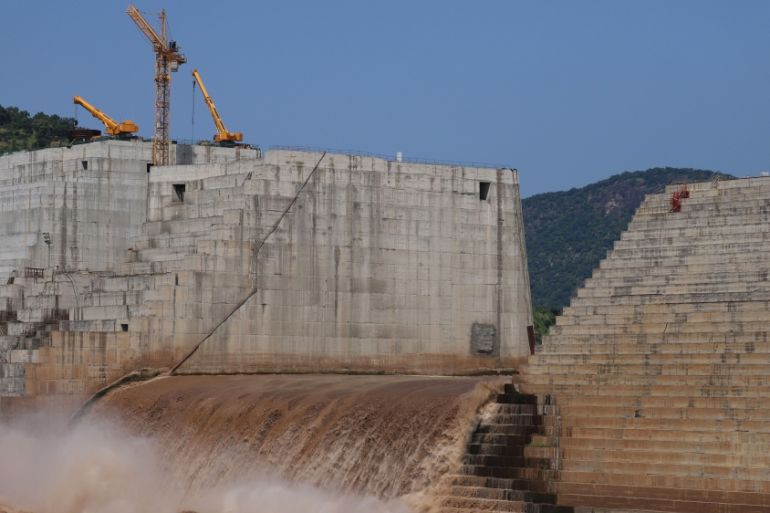Egypt, Ethiopia ‘agree’ to resume talks on massive Nile dam
Stalled technical discussions on Grand Ethiopian Renaissance Dam will restart, Cairo says after leaders meet in Sochi.

Egypt and Ethiopia‘s leaders have agreed to restart the work of a committee aimed at brokering an agreement on the operating terms of a giant hydropower dam, an Egyptian presidency spokesman said.
The apparent breakthrough on Thursday was announced after a meeting between Egyptian President Abdel Fattah el-Sisi and Ethiopian Prime Minister Abiy Ahmed on the sidelines of a Russia-Africa summit in the Black Sea resort of Sochi.
Keep reading
list of 3 itemsEthiopia’s Abiy Ahmed issues warning over Renaissance Dam
Will the largest dam in Africa ever be completed?
It came after a long-running diplomatic spat between Cairo and Addis Ababa over the Grand Ethiopian Renaissance Dam (GERD) on Ethiopia’s Blue Nile escalated in recent days, with bellicose rhetoric prompting a mediation offer from the United States.
The Egyptian foreign ministry on Wednesday said Cairo had accepted Washington’s overture for a meeting of foreign ministers from Egypt, Ethiopia and Sudan, the third nation affected by GERD, on the $5bn infrastructure project. It did not state a date for the talks, or if the other nations had agreed to attend.
But in his statement on Thursday, el-Sisi’s spokesman made no mention of a mediator but said the technical committee would resume its work “in a more open and positive manner, in order to reach a final vision on the rules for filling and operating the dam”.
Ethiopia’s Ministry of Foreign Affairs meanwhile confirmed el-Sisi and Abiy had held “discussions” over the project in a post on Twitter.
#Ethiopia and Egypt Held Talks on the Renaissance Dam
Prime Minister Dr. Abiy Ahmed discussed bilateral relations with Egyptian President Abdul Fatah al-Sisi.#EBC pic.twitter.com/eiej0ZtdQE— MFA Ethiopia🇪🇹 (@mfaethiopia) October 24, 2019
Cairo frets over scarce waters
The work of the technical committee had failed to produce an agreement despite years of meetings between officials from Ethiopia, Egypt and Sudan.
Earlier this month, Egypt said it had exhausted efforts to reach a pact on conditions for operating the dam, the largest in Africa, and filling the reservoir behind it.
Cairo is concerned the project, located near Ethiopia’s border with Sudan and approximately 70 percent complete, will restrict its already scarce share of water from the Nile.
Egypt wants Ethiopia to agree to release a minimum of 40bn cubic metres of water from the dam annually. It is also calling for the accompanying reservoir to be filled over a longer period than the four or so years envisaged by Addis Ababa, in order to ensure water supplies remain sufficient in the event of droughts.

The Nile provides approximately 90 percent of Egypt’s irrigation and drinking water needs and the country claims “historic rights” to the river guaranteed by treaties from 1929 and 1959.
Ethiopia, for its part, says the dam is crucial to its economic development and, at its peak, will generate more than 6,000 megawatts of electricity.
Addis Ababa has also accused Egypt of trying to sidestep the negotiation process over the project.
Abiy earlier this week said his country would not be stopped from completing the dam, warning that Addis Ababa could “deploy many millions” of people in the event of any conflict over it.
“Some say things about use of force [by Egypt]. It should be underlined that no force could stop Ethiopia from building a dam,” Abiy, the winner of this year’s Nobel Peace Prize, said on Tuesday. “But war is not a solution.”
Abiy’s comments were met with scorn by Egypt, which labelled them “unacceptable”.
Russia, which is hosting the Sochi summit in an attempt to expand its influence in Africa, meanwhile said on Thursday it is ready to play a role in resolving the dispute.
“The dam … was discussed during [Russian President Vladimir Putin’s] meeting with the president of Egypt, and during a meeting with the prime minister of Ethiopia,” the AFP news agency quoted Kremlin spokesman Dmitry Peskov as saying.
Putin told the two leaders they should take advantage of their presence in Sochi to “directly discuss [their] concerns” and that he also offered “his assistance”, Peskov added.